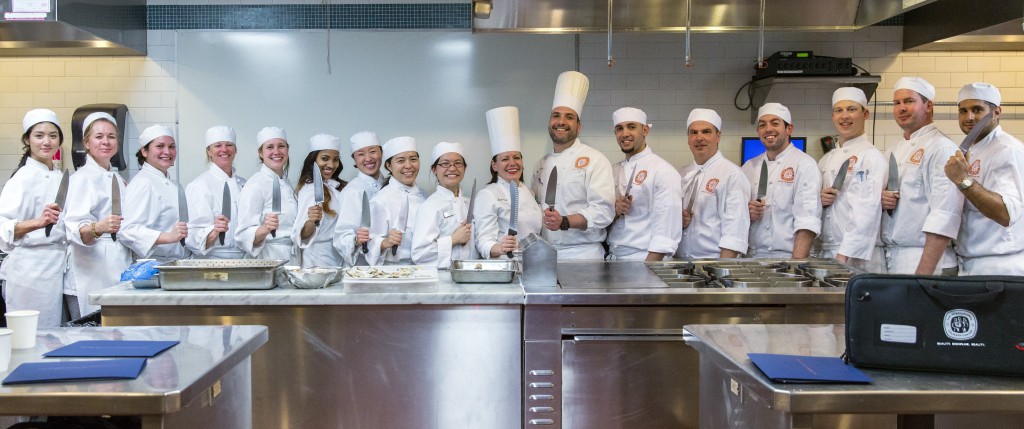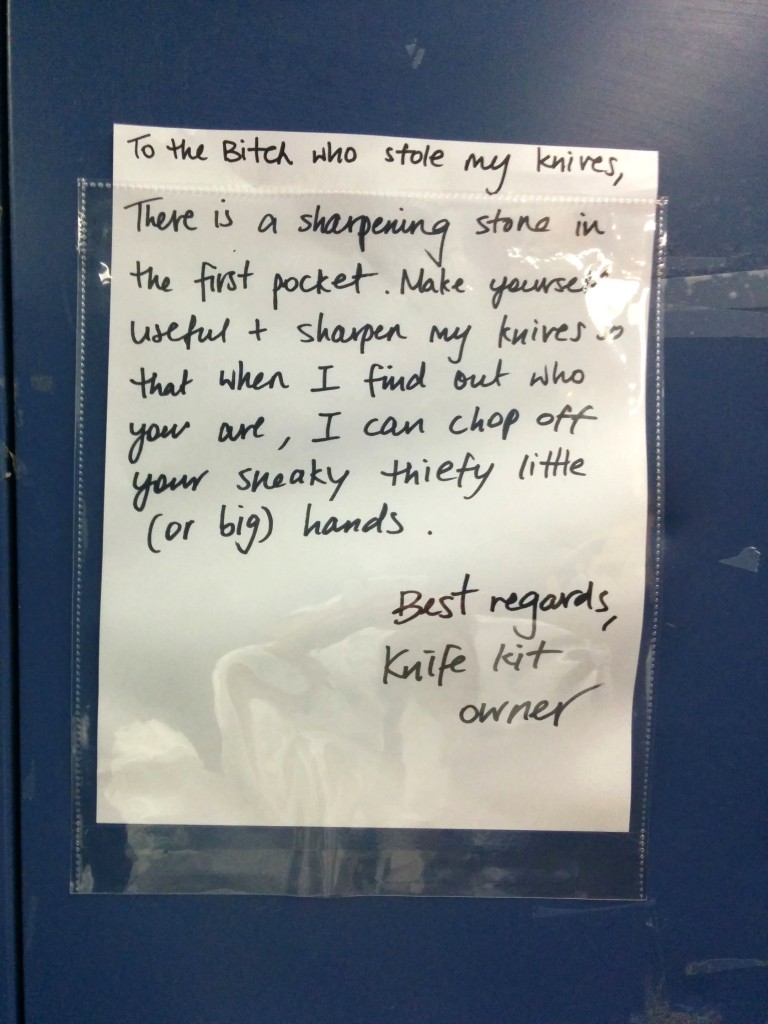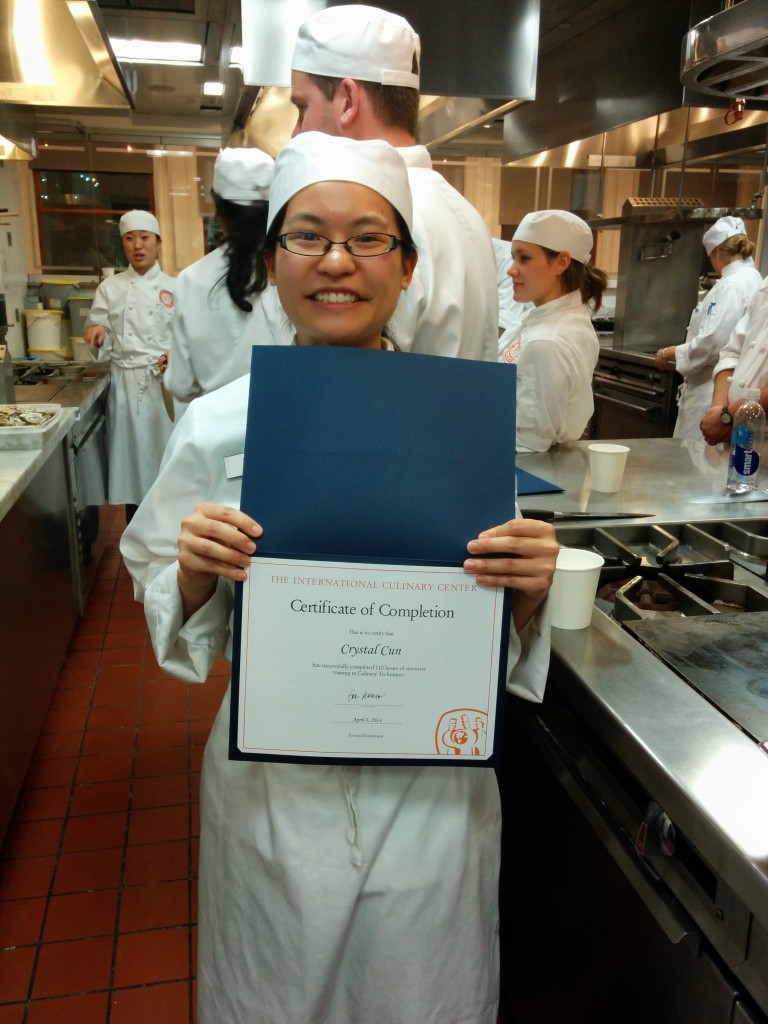
After 22 classes and 110 hours in the kitchens, I am sad but proud to have finished the Culinary Techniques course at the International Culinary Center.
We began on day one by struggling to chop some onions and carrots, and trying to memorize the French names of all the new equipment. Some of us cut ourselves simply pulling knives out of our bags. Somehow that lesson took five hours to cover. We were green as the tray of herbs that was passed around for an identification lesson.
By the last class, the metronome had sped up but we were keeping pace. Dice the mushrooms, cover them with parchment, reduce the sauce, steam the mussels, put everything together in a painstakingly labor intensive French fashion that looks and tastes better than any version you’ve cooked at home. The initial novelty had worn off, replaced by a comfortable autopilot.
In a nutshell, here’s what I learned in culinary school:
- The primary difference between home cooking and restaurant cooking is that you parcook ingredients and hold them until they’re needed for service. So you take a lot of steps to ensure the quality of the food is preserved in that waiting period (holding vegetables in acidified water so they don’t turn brown, shocking green vegetables so they stay green, putting plastic wrap on the surface of pastry cream so that it doesn’t develop a skin).
- Presentation is the key to elevating your food from a $12 diner-style plate to a $45 entree at a fancy bistro. Rather than mixing everything together, take pains to cook ingredients separately so you can choose the prettiest, most uniformly shaped pieces to place on the plate.
- When in doubt, add a few pinches of salt and a squeeze of lemon. Also, add butter to sauces and cooking surfaces liberally.
- Follow the recipe and chef’s instructions religiously…but know when to deviate from the directions because every cut of meat, every dough and every sauce is a unique snowflake.
- You don’t play with the team you want, you play with the team you have. So try to bring out the best in all of your station partners, learn from their strong suits and pick up the slack when they need some guidance.
- Chop your herbs super fine.
- Saying “Yes, Chef” is the proper response to almost everything, especially when you’re getting chewed out.
- Oh and, whatever you do, do NOT misplace your knives a couple days before your final exam. Because if you do, even leaving notes like this in the locker room won’t help you get them back.

Where do I go from here? I’ve basically done the equivalent of the first level of the ICC professional culinary arts program, and I could opt to bridge into the rest of the year-long program at this point. It would simply require passing a written test and timed practical exam, and forking over another $35,000 or so. Culinary school has been a wonderful, magical place with some of the highs and food-driven nerding out that I experienced in Italy. If money were no object, then I would leap at continuing with the full career program. Unfortunately, I don’t really have the budget to stick with it, and I have no intentions of being a full-time chef (I already have a great day job in the food industry) so I can’t justify spending the money for what would essentially be a vanity degree.
There is an obvious solution here, which was further driven home for me at last month’s MAD Mondays panel on “What We Talk About When We Talk About Being a Chef.” During the discussion, an ambitious 17-year-old with experience in some fine NYC restaurants asked, “Should I go to culinary school?” Mario Batali (Babbo, Del Posto) answered first: “Yes. They may not be creating restaurateurs at the CIA, but they’ll teach you all the mother sauces, the fundamentals, etc.” Gabrielle Hamilton (Prune) took the opposite tack: “No. Take the $40,000, rent an apartment in NYC and work, or even better, go get an arts degree so your mind isn’t empty. You’ll wash dishes either way when you get out, and if you get a liberal arts degree, you’ll be more interesting to talk to when you’re standing next to me.” Finally, Riad Nasr (formerly at Balthazar) weighed in: “It serves a purpose, though I’m not saying you should finish culinary school. $80,000 for two years is a lot of money. You could go to Berlin for that, so maybe you spend a year in culinary school and a year in Berlin?”
So, last weekend I drew up a list of restaurants in my neighborhood that espouse culinary philosophies and techniques that I want to learn more about. With some contact cards and a short cover letter in hand, I began knocking on doors. Much to my surprise, the first chef I blurted out my story to said I could come back next Saturday.
Out of the pan, into the fire. Time to sharpen my knives.

One thought on “What I Learned in Culinary School (and Why I’m Quitting)”